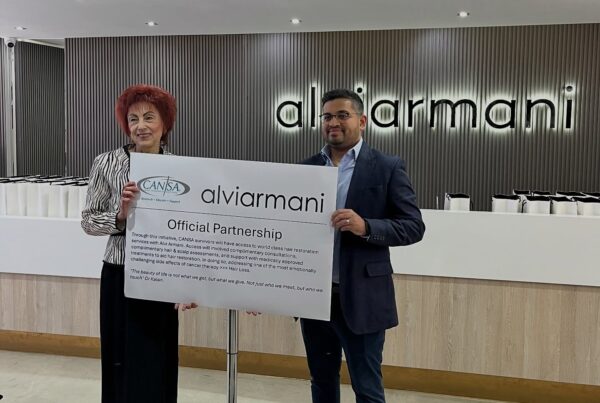Manage your fear of leukemia by equipping yourself with knowledge, writes Campaigning for Cancer CEO Lauren Pretorius.
Leukemia used to be a very scary word, as most people in their forties or older can remember when it was dangerous cancer. But as with many cancers, the last two decades or so have seen immense strides in the treatment being made, and mortality rates are in steady decline. If you know what to look out for and where to get help and medical care, leukaemia no longer means a high risk of death.
Leukemia Day is on 4 September 2022, and it’s important to help individuals understand the disease and manage their risks.
What is leukemia?
Leukemia is a cancer affecting the blood, a cancer of the tissues where your blood is formed, such as the bone marrow and the lymphatic system, causing rapid growth of abnormal blood cells.
One of the reasons leukaemia was so feared is because it’s the most common cancer in children. A South African paper that looked at two pediatric oncology units in the Free State and Western Cape found that 25% of the cancers children presented with were leukemias. And a European paper noted that acute lymphoblastic leukemia (ALL, the most common form of the disease to impact children) “accounts for 28% of all newly diagnosed cases of cancer in childhood”.
A decline in death rate
But as with many other cancers, the prognosis for children with leukaemia has improved:
“The 5-year survival rate for children with ALL has greatly increased over time and is now about 90% overall,” says the American Cancer Society.
So there are lots of reasons to be hopeful; with early diagnosis and good treatment, the chances of survival are high.
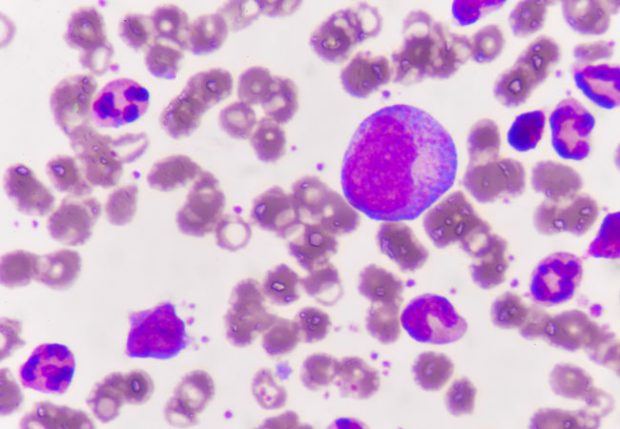 However, those stats apply to children in the developed parts of the world. The reality in South Africa is different, and there are several factors that impact children’s mortality rates.
However, those stats apply to children in the developed parts of the world. The reality in South Africa is different, and there are several factors that impact children’s mortality rates.
Early detection of cancer is vital – the later the stage a child is at when they arrive at an oncology unit for treatment, the worse their chances.
Do they have access to healthcare facilities where they will be diagnosed and referred for treatment? Physical access to clinics and hospitals can be difficult, time-consuming, and costly, delaying diagnosis, and so pediatric oncology units are relatively rare in the public sector.
Other factors that affect children’s prognosis include their state of health – a child that is malnourished or struggling with another disease (TB, perhaps, or HIV) has a higher risk of death.
Knowledge is power
To ensure that all children have the best shot at recovering from leukaemia if they get it, it’s important that adults across South Africa have an understanding of the cancer and its symptoms. Parents, extended family, teachers, church youth leaders, sports coaches, and any adult in contact with children and young people should be aware of the signs that might mean a child has leukemia. The sooner red flags are raised, the better the child’s chances.
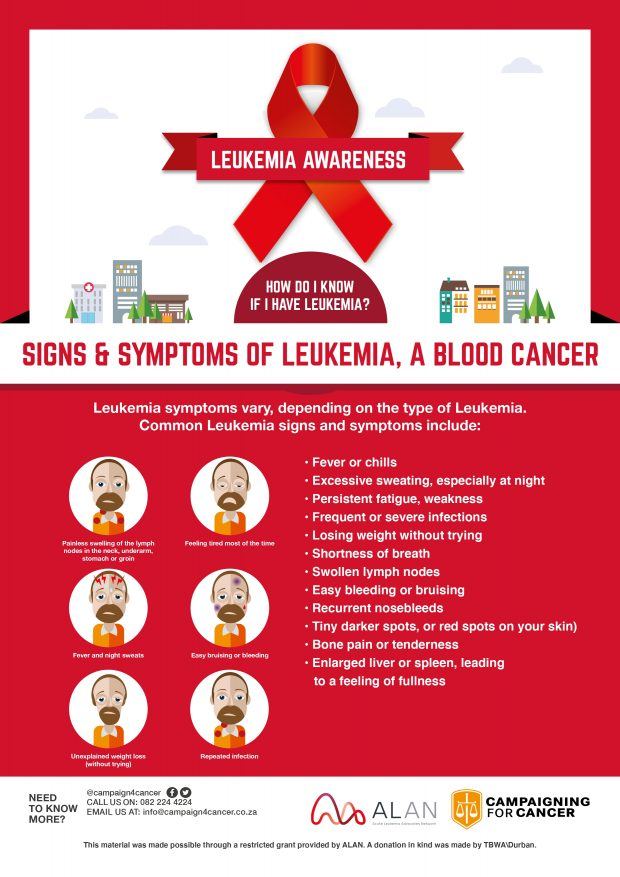
That’s why Campaigning for Cancer has joined forces with ALAN (Acute Leukaemia Advocates Network) to create and share these two posters summarizing critical info about leukemia. There is hope that they will be widely distributed and displayed so that empowering and life-saving knowledge is available to everyone.
Help raise Awareness for Leukemia
ALAN and Campaigning for Cancer urge you to raise awareness on World Leukemia Day,4 September 2022, by sharing your own leukaemia story with the hashtags #WLD22 or #WorldLeukemiaDay.
Share information about this cancer using these hashtags, too – for graphics and other resources, head here. If you or an organisation you work with are looking for material about this cancer or any other cancers, email Campaigning for cancer on [email protected], or connect via social media on the handle @campaign4cancer.
About the author
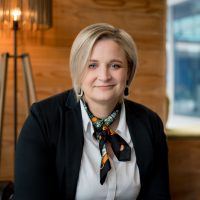 Lauren Pretorius is the CEO and co–founder of Campaigning for Cancer NPC, an advocacy patient group that lobbies for the promotion and protection of patients‘ rights with regards to policy, healthcare costs and healthcare delivery. Pretorius has worked in the cancer civil society since 2005. She was the chief operating officer of Breast Health Foundation, a co–founder of Bosom Buddies and a consultant to the Prostate Cancer Foundation of South Africa, as well as various other cancer charities.
Lauren Pretorius is the CEO and co–founder of Campaigning for Cancer NPC, an advocacy patient group that lobbies for the promotion and protection of patients‘ rights with regards to policy, healthcare costs and healthcare delivery. Pretorius has worked in the cancer civil society since 2005. She was the chief operating officer of Breast Health Foundation, a co–founder of Bosom Buddies and a consultant to the Prostate Cancer Foundation of South Africa, as well as various other cancer charities.
Pretorius managed the pilot LIVESTRONG/American Cancer Society‘s SEI Survivor Forum in South Africa and has represented South Africa as a Global Cancer Ambassador for the UN‘s Resolution for Non–Communicable Diseases. She chaired the Civil Society Commission at the National Department of Health‘s NCD Summit and was a member of National Cancer Registry implementation team as well as a founding member of the executive committee of the Cancer Alliance. She serves as a director to the Lymphoma Coalition, an international alliance of 75 lymphoma patient groups across 42 countries. Most recently she was a signatory to the Presidential Health Compact and sat on the Joint Technical Monitoring and Evaluation Committee for the Compact in her role as head of the Patient User Network, a network of 118 health–related patient groups.
Read her full biography below.


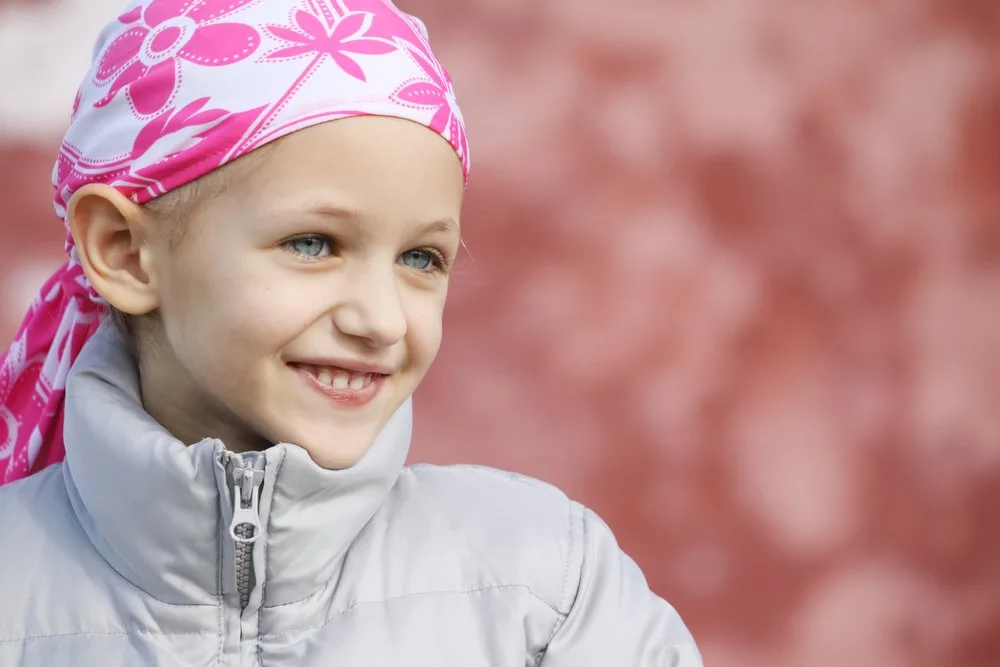
![women [longevity live]](https://longevitylive.com/wp-content/uploads/2020/01/photo-of-women-walking-down-the-street-1116984-100x100.jpg)







